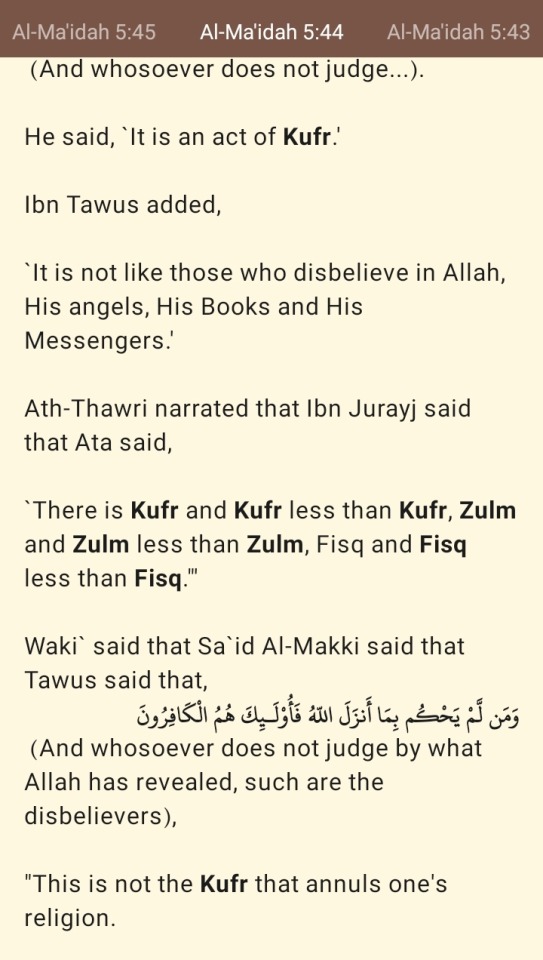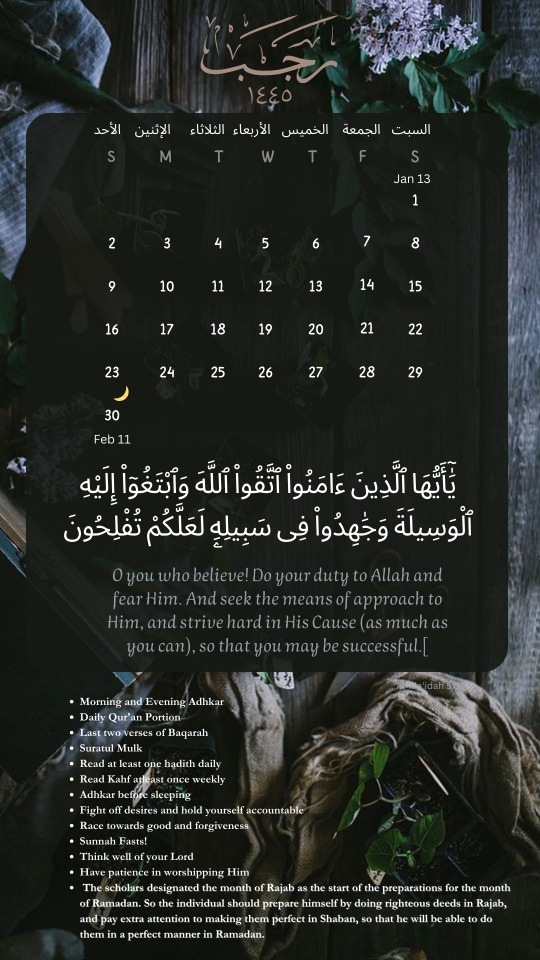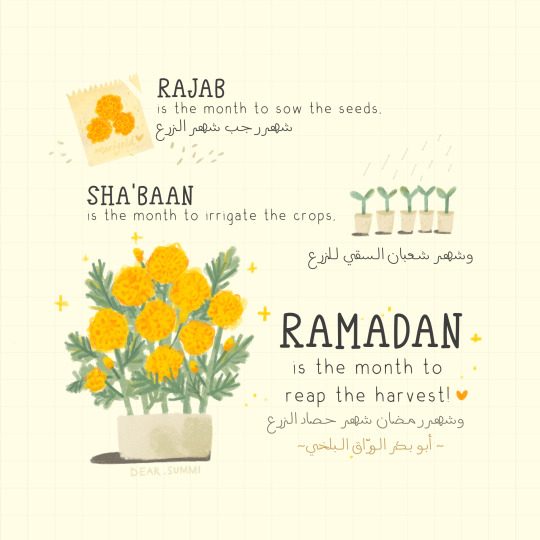Personal Archive - Reminders for myself first and foremost
Don't wanna be here? Send us removal request.
Text
Barakah is the ability to do more with less. Ask Allah to put barakah in your time, wealth, and energy.
190 notes
·
View notes
Text

"Ya Allāh, I ask You for Your love, the love of those who love You, and the deeds which will cause me to attain Your love."
3K notes
·
View notes
Text

☀️ Spread positivity wherever you go:
"If you can't find the sunshine, BE the sunshine".
"Be the sunshine in someone's cloudy day".
Did you know that this was the Sunnah of our Rasululllah ﷺ?
Anas reported: The Prophet, peace and blessings be upon him, said,
يُعْجِبُنِي الْفَأْلُ الْكَلِمَةُ الْحَسَنَةُ الْكَلِمَةُ الطَّيِّبَةُ
“I am delighted by optimism, the good word, the kind word.”
Source: Ṣaḥīḥ Muslim 2224
----
Al-Haafith Ibn Hajar mentioned that the Prophet, صلى الله عليه وسلم liked good, encouraging words because displaying pessimism is considered mistrust of Allaah The Almighty for no reason. On the contrary, optimism signifies trust in Allaah The Almighty. Indeed, believers are commanded to trust in Allaah The Almighty and think well of Him in all cases and situations.
https://www.islamweb.net/amp/en/fatwa/28954/
🖊️ kalimatultayyibah
5 notes
·
View notes
Text
IT IS KUFR DŪNA KUFR
Weakness of Statement Attributed to Ibn ‘Abbâs:
“kufr Dûna kufr (i.e. kufr less than kufr).”
[Modern Scholars of Irja and their followers use this to justify Tawagheet rulers.]
- - - - - - - -
AL-HÂKIM STATED: AHMAD IBN SULAYMÂN AL-MAWSILÎ INFORMED US: ‘ALÎ IBN HARB TOLD US: SUFYÂN IBN ‘UYAYNAH TOLD US: ON THE AUTHORITY OF HISHÂM IBN HUJAYR: ON THE AUTHORITY OF TÂWÛS WHO SAID:
IBN ‘ABBÂS (RADIYALLAHU ‘ANHUMÂ), SAID: “IT IS NOT THE KUFR THEY ARE TAKING IT TO. IT IS NOT KUFR WHICH TAKES ONE OUTSIDE THE MILLAH. “AND WHOSOEVER DOES NOT JUDGE BY WHAT ALLÂH HAS REVEALED, SUCH ARE THE KÂFIRÛN.” IT IS KUFR DÛNA KUFR (I.E. KUFR LESS THAN KUFR).”
Likewise, it was narrated by Ibn Abî Hâtim in his “Tafsîr”, also from the path of Hishâm Ibn Hujayr from Tâwûs from Ibn ‘Abbâs about Allâh’s saying: “And whosoever does not judge by what Allâh has revealed, such are the Kâfirûn.”He said, “It is not the Kufr you are taking it to.”
This narration is weak due to a number of defects. The first is that the chain contains Hishâm Ibn Hujayr. He was declared weak by Ahmad Ibn Hanbal, Yahyâ Ibn Ma’în, Sufyân Ibn ‘Uyaynah, Yahyâ Ibn Sa’îd and others.
The second is that Hishâm Ibn Hujayr is the only one who narrated this phrasing from Tâwûs. So the fact that out of all of the companions of Tâwûs, the only one to narrate this phrasing from him was Hishâm, is a defect as well. This is referred to as Tafarrud.
The third is that in narrating this phrase, Hishâm contradicted those who are more reliable than him, namely ‘Abdullâh Ibn Tâwûs. This is because when ‘Abdullâh Ibn Tâwûs narrated this from his father, he did so with the phrasing: “It is Kufr”And other similar phrasings.
This is reffered to as “Mukhâlafah”. This is likely because Hishâm Ibn Hujayr is found in “Sahîh al-Bukhârî” and “Sahîh Muslim”. However, he was not relied upon by these Imâms. What does this mean? It means that Al-Bukhârî and Muslim would sometimes narrate Ahâdîth with authentic chains of narration, and before or after them, narrate the same Hadîth with a weak narrator in the chain as a secondary narration. Likewise, he is only in one chain in “Sahîh al-Bukhârî”, and only two in “Sahîh Muslim”.
In “Sahîh al-Bukhârî”, he is in a chain of the Hadîth of the Prophet Sulaymân Ibn Dâwûd (`alayhimâ as-salâtu wa-salâm): “THIS NIGHT I WILL GO WITH NINETY-NINE WOMEN…” IN “THE BOOK OF EXPIATION OF OATHS”.
This narration of the Hadîth includes Hishâm but we find that he was replaced in another narration of this same Hadîth by ‘Abdullâh Ibn Tâwûs in “The Book of Marriage”. And likewise with Imâm Muslim; he only has two Ahâdîth which contain him in their Sanad and he does not narrate them except that another man has replaced Hishâm in a different narration of the same Hadîth. The first narration was the exact same Sanad and phrasing as what has come from Hishâm
…in the Hadîth of the Prophet Sulaymân (#1,654) and we see that Hishâm is replaced in the very next narration by ‘Abdullâh Ibn Tâwûs just as he was in the alternate narration by Imâm Al-Bukhârî. And the second narration with Hishâm is a Hadîth on the authority of ‘Abdullâh Ibn Abbâs who said: “Mu’âwiyah said to me: ‘Did you know that I cut (the hair) from the head of the Messenger of Allâh (sallAllahu `alayhi wa sallam) at Al-Marwah with scissors?’ So I said to him, ‘This is an argument in our favour…”
And Hishâm is replaced in this chain of narration by Al-Hasan Ibn Muslim in the narration immediately after it. For more on this, refer to “Khulâsat al-Qawl al-Mufhim ‘Alâ Tarâjim Rijâl al-Imâm Muslim.” by Al-Harawî
So although Al-Hâkim, Al-Albânî and others did authenticate this, we can see that it is likely based on these facts. Yet this is not a certain method of ascertaining whether the narrators are all Sahîh as it is clear that Al-Bukhârî and Muslim only narrated from Hishâm in those cases where they found other evidence to support what came through him. Lastly, that Al-Hâkim’s authentications are not to be relied upon solely. This was discussed by Ibn Taymiyyah in “Qâ’idatun Jalîlah Fit-Tawassul wal-Wasîlah”, pg. 170-171…
Ibn al-Qayyim in “Al-Farûsiyyah”, pg. 245 and 276, Ath-Thahabî in “Siyar A’lâm an-Nubalâ’”, Vol. 17/175, Ibn Hajar in “An-Nukat ‘Alâ Kitâb Ibn as-Salâh”, Vol. 1/314-318 and others.
Other References: [1] “Al-Mustadrak ‘Alas-Sahîhayn”, Vol. 2/313 [2] Look to “Tah’thîb at-Tah’thîb”, Vol. 6/25, “Al-Kâmil Fî Dhu’afâ’ ar-Rijâl”, Vol. 7/2569, “Adh-Du’afâ’ al-Kabîr”, Vol. 4/238, “Hadî as-Sârî”, Vol. 447-448, “Tah’thîb al-Kamâl”, Vol. 30/179-180 …
[3] “Tafsîr ‘Abdur-Razzâq”, Vol. 1/186, “Ta’thîm Qadr as-Salât”, pg. 39, “Jâmi’ al-Byân”, Vol. 10/356 and elsewhere. /// Wa Allahu Aalim/// END
via brother Nurlan al Azerbaijani. @Nurlan_Nomad (twitter)
---
Subhanallah. Allahu Akbar.
Just yesterday I was reciting Surah Maaidah and came across the verse about those judging by other than what Allah revealed. and the English translation by Muhsin and Khan had written (disbelievers - of a lesser degree as they do not act on Allâh’s Laws) I went on to read the tafsir of the verse from Ibn Kathir.
And now Allah subhanahu wa ta'ala made me come across this to clear this matter for me. Subhanallah.
---
We keep telling others to read the tafsir and if they come across this they would believe this and use it against us. Subhanallah. Shows us the importance of seeking knowledge.

12 notes
·
View notes
Text
Ā’isha رضي الله عنها said:
“Ask Allah for everything, even shoelaces,
because if Allah does not make it easy for you to obtain it you will not obtain it.”
[Musnad Abu Ya’laa, v. 8, pg. 44]
378 notes
·
View notes
Text

What have you done today for Allāh to love you?
261 notes
·
View notes
Text
Ibn Hubayrah رحمه الله said :
“From the devil's trick is to turn people away from Tadabbur (pondering on) Qur’ān for he knows guidance comes from Tadabbur.”
● [ذيل طبقات الحنابلة ٢/١٥٦]
223 notes
·
View notes
Text

https://t.me/ReleaseTheCaptives
2 notes
·
View notes
Text
Ibn Al-Qayyim رحمه الله said:
“Do not think that it was your soul that drove you to doing goodness,
rather you are a servant who Allah loved, so do not waste this love or He will forget you”
[‘Iddat Al-Sābirīn]
156 notes
·
View notes
Text
❤️
instagram
1 note
·
View note
Text
لم يعد لي رغبة في شئ سوى أن أصلح الذى بيني وبين الله
instagram
9 notes
·
View notes
Text

@dear.summi (instagram)
5 notes
·
View notes
Text
Calendar for the sacred month of Rajab

Calendar for the 7th Hijri Month: The Sacred Rajab 1445✨
The month of preparations for Ramadan, the month of giving up sins, the month of planting and sowing good deeds, and the key to months of goodness and blessings ♥
As-Sabt (Saturday) till Maghrib is 1st Rajab 1445.
Jumadul Akhir was 30 days as moon was not sighted Alhamdulillah.
-via Fernweh
6 notes
·
View notes
Text

The month of Rajab is the key to the months of goodness and blessings.
Abu Bakr bin al-Warraaq al-Balkhi said, “Rajab is the month to sow the seeds; Sha’baan is the month to irrigate the crops; and Ramadan is the month to reap the harvest.”
It has also been transmitted from him, “Rajab is like the wind; Sha’baan is like the water-laden clouds; and Ramadan is like the rain.”
Others have said, “The year in its entirety is like a tree: during Rajab its buds sprout; during Sha’baan it sends forth its branches; during Ramadan its fruit ripens; and the believers are the farmhands who harvest that fruit.”
It is opportune for whoever has darkened the scroll of their deeds with sins to cleanse it with repentance during this month. And anyone who has squandered his lifetime in vain should take advantage of the abundant and available treasures in this month of what remains of his lifespan.
شهر رجب مفتاح أشهر الخير والبركات ؛ قال أبو بكر الورّاق البلخي : شهر رجب شهر الزرع ، وشهر شعبان السقي للزرع ، وشهر رمضان شهر حصاد الزرع. وعنه قال : مثل شهر رجب مثل الريح ، ومثل شهر شعبان مثل الغيم ، ومثل شهر رمضان مثل المطر. وقال بعضهم : السنة مثل الشجرة ؛ وشهر رجب أيام توريقها ، وشعبان أيام تفريعها ، ورمضان أيام قطفها ، والمؤمنون قطافها . جدير بمن سوَّد صحيفته بالذنوب أن يبيضها بالتوبة في هذا الشهر ، وبمن ضيّع عمره في الباطلة أن يغتنم فيه ما بقي من العمر
Lataa’if al-Ma’aarif
Pic via @dear.summi instagram
15 notes
·
View notes

